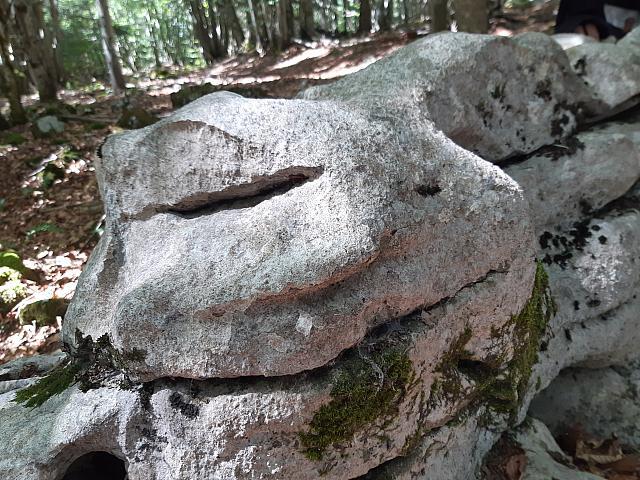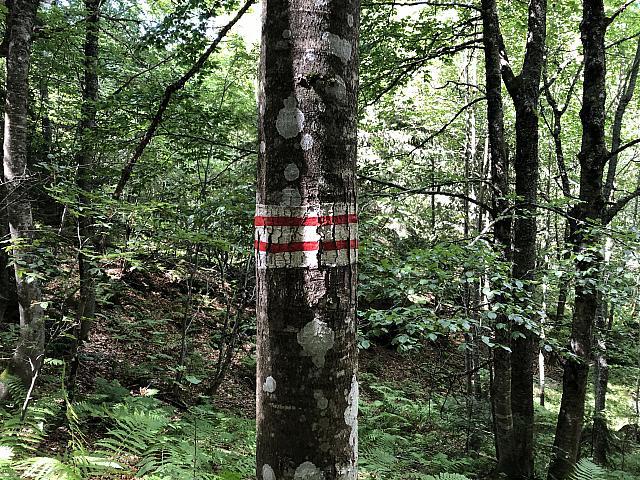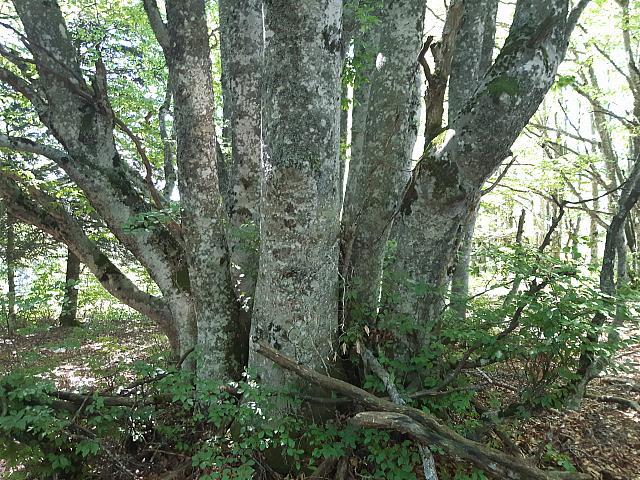Letters - on the violence of naming

Monday 24 August
Maybe out of sync, but something I wanted to share:
the violence of naming
what is in a name
what is your name?
names names
naming
naming
is identifying
distinguishing
placing
ordering
is categorizing
you don't need my name to relate
why name me?
just feel me
I am beneath, beside, underneath, with and above
I can hold you
you can hold me
I am a tree
forget Linnaeus
eat me
touch me feel me
have a nice day!!!!
Annie
Tuesday 25 August
Dear Annie,
I hope you’re well. It’s been a while since we were all working together in Hasselt. In the meantime, many things have changed. While we tried to stay connected as a group by discussing and reading together, the world abruptly got disconnected.
Living in a multispecies world is also this, being entangled with beings we don’t like to become entangled with, a virus, moving invisibly from one body to the next, creating a global and hostile army that grows and feeds on human togetherness. Being immersed in connections with other beings can bring lucid dreams of stones, trees and spirits; it also brings realities that are violent, harsh and ugly, like a lioness killing its own cubs. The key to the multispecies world is balance, balancing out the too many or the too many of the same, like the endless walnut plantations we are surrounded by here in the area and the way they are prone to disease.
Today we explored the surroundings by walking, sharing and learning. The geological processes that formed the ancient plateaus of the Vercors rose straight up from the bottom of the sea. The glacier that moved through the landscape left pebbles and stones everywhere. These pebbles and stones are used to build walls, borders and houses. Here, in this turbulent landscape, formed by movements still ongoing, as Anne-Laure put it so nicely, ‘the earth speaks a lot’.
When walking you need to keep your eyes on the ground or you’ll trip or fall down one of the many holes and cracks in the surface.
Loveliest wishes,
Ils
PS: I will come back to your poem in my next letter.
Tuesday 25 August
Thank you so much, Ils, for your touching letter!
Looking forward to reading ‘today’.
Annie
PS: tomorrow I will use English again, sorry.
oui, oui le virus fait partie de l'enchevêtrement des choses comme ce que nous en disons,
du covid,
comme de nos angoissesl'état néerlandais a conseillé aux gens qui viennent de l'Hérault d'aller en quarantaine à leur retour
conseillétrop et pas assez
ouas if we would know
des conseils, des interdictions, des règles, des incitations
magictouching trusting feeling
si les spells me kunnen afleiden, ja dan graag
en/chantons-nouscobri-ari-bellails sumwegval ikkenie
cal-celt vlier jetetouchpsspieloeboulou troeloelou
tsjak(à haute voix - fort - libre)

Wednesday 26 August
Dear Annie,
Thank you so much for sending this beautiful poem about the trees. It resonated a lot with us and also made us laugh, especially after there being so much confusion about names of trees in different languages during our first day exploring the forest. Beech, birch, beuk, berk, buche, hêtre, bouleau, lijsterbes or vlierbes … You’re right, we need to get acquainted with the trees in ‘other’ ways, in order to understand what they tell us – feeling, holding, listening, eating. Unfortunately the lijsterbes, the only tree we met that is bearing fruit right now, apparently is not very tasty, and An advised us to eat it only if we were in acute need of food.
The walnut, the main fruit of the region, also is still hiding inside its green shell, enjoying the last warm summer days for its final moments of growth. In the Vercors, they would say that we are in the time ‘just before the nuts’, as the passing of the year is expressed here as either being before, during or after the nuts. I thought it was a nice example of different lives and temporalities intertwining.
We also learned that in Celtic mythology the walnut tree is associated with sensitivity, which is key to developing new ways of living with other life forms. Sensitivity and attention are needed to find other ways of listening, for attuning ourselves to other types of language and thinking that are completely unfamiliar to us. A language that perhaps doesn’t even communicate anything but only perceives, as suggested by the President of the Association of Therolinguistics in Ursula K. Le Guin’s short story, ‘The Author of the Acacia Seeds’.
Since we reread this story yesterday morning as an inspiration for our first day of work, I would like to share the fragment with you as well.
When pondering the idea that some day we will discover the art of plants, the President writes:
Can we in fact know it? Can we ever understand it? It will be extremely difficult. That is clear. But we should not despair. Remember that so late as the mid-twentieth century, most scientists and many artists, did not believe that Dolphin would ever be comprehensible to the human brain – or worth comprehending! Let another century pass, and we may seem equally laughable. ‘Do you realise,’ the phytolinguist will say to the aesthetic critic, ‘that they couldn’t even read Eggplant?’ And they will smile at our ignorance as they will pick up their rucksacks and hike on up to read the newly deciphered lyrics of the lichen on the north face of Pike’s Peak.
And with them, or after them, may there not come that even bolder adventurer – the first geolinguist, who ignoring the delicate, transient lyrics of the lichen, will read beneath it the still less communicative, still more passive, wholly atemporal, cold, volcanic poetry of the rocks: each one a word spoken, how long ago by the earth itself, in the immense solitude, the immenser community, of space.
Loveliest wishes,
Ils
Wednesday 26 August
Dear Ils,
Thank you for your beautifully crafted letters, thank you for making me part of the Alchorisma process at a distance.
I send this early today and might not have time to write something tomorrow, but will expect a call around 10 – if someone wants to.
I will try to keep up with the work in the pads.
love
Annie
|I am a graft|a misfit|a hybrid|not good enough for what I am|I am usefulI have to be usefulusefulusefulusefulusefulusefuluseful |usefulusefulusefulusefulusefulusefulusefulusefulusefulusefulusefulusefulbut not alone|grafted in society|I need you|
what if we stopped talking about communication and of reading non-humans, of trying to understand ‘them’, what if we were ‘with’, yes, indeed only perceiving what we can perceive … which is not much
(btw who is this ‘we’?)
how can I see my chakra?
"Participation is not a design fix for machine learning. Ignoring patterns of systemic oppression and privilege leads to unaccountable machine-learning systems that are deeply opaque and unfair. These patterns have permeated the field for the last 30 years. Meanwhile, the world has watched the exponential growth of wealth inequality and fossil-fuel-driven climate change. These problems are rooted in a key dynamic of capitalism: extraction. Participation, too, is often based on the same extractive logic, especially when it comes to machine learning."1
What happens if we look at algorithmic capitalism as a magical process – In fact it feels like it is one – Is there magic to heal the process? Or do we, again, have to be ‘with’? … magical understanding might also be a way to control …
what could be an interspecies opera? and could Fibonacci figure in it - how to turn this into something multi-perceivable?

Thursday 27 August
Dear Annie,
I hope you are well. I hope you are safe.
Who is ‘we’, you ask? Good question. It includes those who want to be included, even if, in the end, it is only me, myself and I. It’s not politically correct and part of the problem to say this, I know that. I simply like ‘we’ better than ‘I’ and I certainly like it better than ‘they’.
Today another difficult but necessary conversation about ‘we’ and ‘I’ came up. No answers, only questions, clouds, mist.
We are suspended.
Floating in thin air.
We follow the rules and wait.
What is natural, human?
What is normal?
What is needed?
What do we miss?
I’m sorry but,
what to do?
Training trees, training bodies,
training dreams.
Please bear with us.
Loveliest wishes,
Ils
Friday 28 August
back home, I have been reading
thanks Ils, thanks Elodie, thanks the pads, thanks all
What do we lose and gain by calling ourselves witches?
Would accepting we can't communicate with plants, trees, stones be an option and humble us and help us to be interdependent and with all.
With love,
Annie

Tuesday 1 September
Dear Annie,
This is my final letter from Vercors. It was raining when we left. The Vercors plateau was covered in a heavy and impenetrable layer of mist, obscuring it from sight. It was nice since we hadn’t had the chance to experience the mountains in this kind of light before. I’m on the train now watching clouds pass by while the landscape is slowly getting flatter. On one side of the train they look bright, on the other side grey and heavy.
What’s there that we took home? Ideas, new plans, two different recipes for tarte Tatin. Not to forget the remainder of a large bag of walnuts I bought at the local Nut Museum which is called Le Grand Séchoir. I wasn’t planning on taking them but after tasting some last night, I decided I would.
The Grenoble nuts tasted different from the ones I’m used to. They weren’t fresh, so it was impossible to peel off the last thin layer of skin (my personal requisite for eating a walnut). Yet still they were very tasty, not dry, shrivelled and bitter like the walnuts from last year I still have lying around and will probably never eat. It’s amazing to see the variety of walnut species that exist around the world. The Nut Museum, as is expected, holds a nice collection of them, all types of different walnuts (round, oval, thick, long, flat, light, dark, black … ). Perhaps you saw this in the pictures we sent.
In order to form a group, you need to travel together – these words from Ursula K. Le Guin often came back to us during the week. So we travelled, walked and ate with each other but also with the snails crawling up wet tents, the sugar-riven wasps, the curious spiders, the uninvited mosquitoes, the sexually confused flies, the refugee beetles, the wild horses in the camping shop as well as the trees, rocks, moss, lichen, and all the strange creatures in-between.
The ones we met, the ones we missed and the many that remained unseen.
Watching trees
Training trees
Performing trees
Becoming a walnut
Do we feel grafted or merged?
Speak soon,
Ils
-
Quoted from: ‘Participation-washing could be the next dangerous fad in machine learning: Many people already participate in the field’s work without recognition or pay. by M. Sloane, MIT Technology Review, 25 August 2020, https://www.technologyreview.com/2020/08/25/1007589/participation-washing-ai-trends-opinion-machine-learning/ (accessed 25 August 2020) ↩